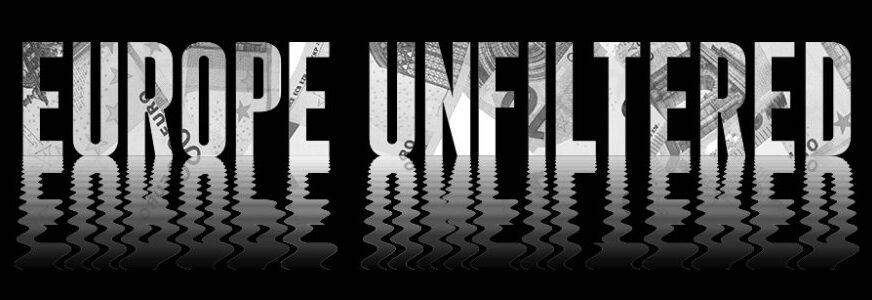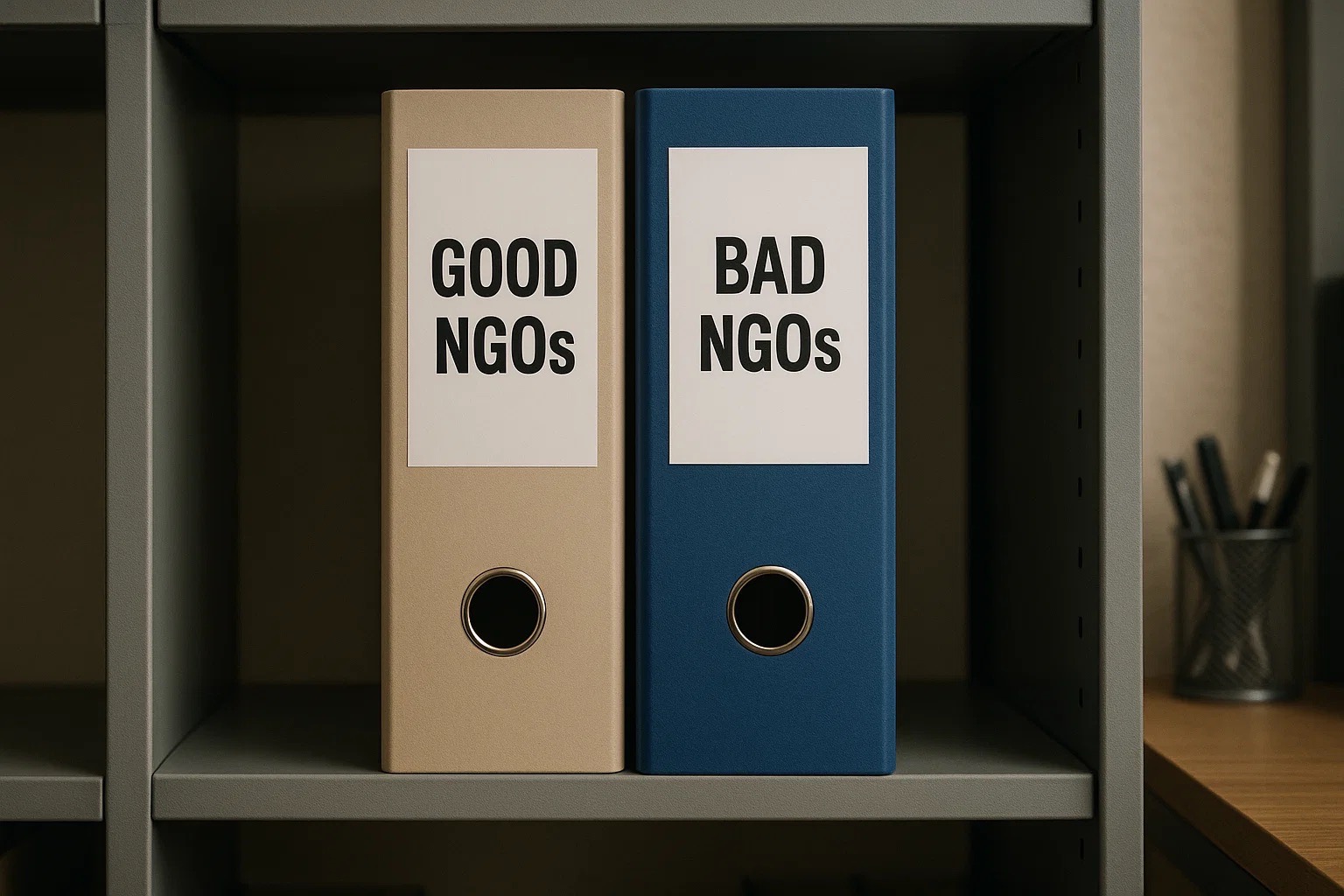Lobbying for Mother Nature as a European “green” lobby group, rainforests and poor, orphaned orangutan babies is trendy. (Insert any random endangered species.)
It opens floodgates of Facebook likes and money at the same time.
A lobby group working in the field is often represented in media as if it’d be fighting its David-style life-or-death war against corporate giants and the big bad “fossil fuel industry”.
Thus, of course the EU’s 2024 guidelines aiming at “defunding” NGOs that lobby the EU are “profoundly undemocratic” and “Orbanesque”. (“Defunding” in this case means that they cannot use EU subsidies for advocacy work, a.k.a. lobbying.) Those who campaign against those poor, well-meaning NGOs are “conservative groups” that use the step to “silence criticism”. Others claim that the Commission’s “gag order” will only boost the dominance of corporate lobby groups in EU decision-making.
The minor detail that “green” lobby groups are anything, but modern Davids are often forgotten or overlooked.
While there are indeed many small, grass roots organizations, most green lobby groups are not much smaller than the fossil fuel giants they’re fighting against. And recent audits by the European Court of Auditors have pointed out that ‘a substantial part of direct funding went to a small number of NGOs’, and it did so in ways that lacked transparency.
Take Greenpeace, WWF, BUND, Mercator for example – these are the few operating in Germany (that country was the focus of Welt’s 2021 in-depth analysis) or the couple large ones working in the EU (known together as Green10). Each one of those is operating with budgets compatible with that of many third-world countries. “Green lobbying” drives significant economic and political decisions while its structure is less transparent than a politician’s promise during campaign season, so are its connections to the government and business sector.
It’s just these are considered the “good NGOs”, fighting for “good causes”.
There is even a space dedicated specifically for the “good lobby”, after all – among its partners are the European Climate Foundation, the Green European Foundation, the Eurogroup for Animals, the Open Society Foundation and the European Parliament, for good measure. They published several articles, all “revealing” the dirty secrets of the greedy travel industry or Big Tech companies.
Because, of course, “the public deserves to know”, how those “bad” lobby groups operate.
But not the “good ones”.
Hence they should be automatically entitled to “virtue premiums” (the term got ‘borrowed’ from American Affairs Journal’s 2023 analysis on Green lobbying), their opinions and viewpoints should be accepted as “settled science” (counter-arguments be damned) and their actions should also be practically immune to any sort of scrutiny.
Even if those lobbyists, posing like a procession of saints are, in fact, far from that.
For example, when they use an EUR15 million grant program (financed by the Commission, more specifically said institution’s environment directorate) to lobby other Commission departments and the European Parliament to push forward the Green Deal agenda.
The European Court of Auditors has repeatedly warned that there was no reliable overview of EU money paid to NGOs: information is published in a fragmented way, the status of such organizations is not properly checked. This literally enables any government or company to use an NGO-camouflage to promote its own political or commercial interests. There is basically no useful information available on who might be stuffing an NGO’s imaginary pocket.
The auditors also made it clear that the Commission ‘did not really disclose the information it held on NGO advocacy activities that were financed by EU grants’.
This latter detail maybe shouldn’t come across as surprising given the von der Leyen Commission’s (or specifically, Commission President Ursula von der Leyen’s) aversion to transparency – it’s enough to point at the recent ruling of the European Court of Justice in the issue known as “Pfizergate”.
Experts almost unanimously agree that in spite of the court’s ruling that the Commission was wrong to refuse to release von der Leyen’s text messages, and, in spite of said institution’s promise to “closely study the ruling and considered its next steps”, because “transparency had always been of paramount importance”, we are unlikely to ever learn, what details von der Leyen and Pfizer-tsar Albert Bourla agreed on.
Von der Leyen won’t leave her position, the Commission won’t be held politically accountable.
The Commission isn’t the only EU institution paying lip service to transparency while hiding behind murky regulations and lax oversight, let it be about nepotism or lobbying.
The European Parliament, the EU’s single directly elected body doesn’t fare much better when it comes to handling its own issues in a transparent manner.
On its website, it proudly cites Article 11 of the Treaty on European Union – you know, the part saying ‘the institutions shall, by appropriate means, give citizens and representative associations the opportunity to make known and publicly exchange their views in all areas of Union action’, in the same sentence as ‘the institutions shall maintain an open, transparent and regular dialogue with representative associations and civil society’.
Yet, if there was something “Qatargate” and “Huaweigate” proved was that the control of lobby activity had more gaps and holes than your average Swiss cheese.
Calls for more transparency were raised after the two “-gates” and new measures were adopted. But, as our previous reporting proves, nothing significant ever changes in the great debate chamber of the Espace Leopold. The more so as Roberta Metsola, herself not an alien to testing the limits of legality, is sitting at the helm.
The European Parliament is just as much uninterested in real transparent operation as any other European body.
The latest news on EU Asylum Agency (EUAA) just proves this.
According to OLAF, the institution tasked with implementing the EU’s asylum law operates more like a family-slash-friends business than an efficient organization. It’s senior management reportedly bypassed every possible regulation related to hiring staff to promote a “friendly circle” into senior positions.
EUAA’s answer?
The OLAF “alleged facts” and none of those “have been found established … no misconduct was found”. A senior manager told Politico that the step was taken for the greater good, namely the EUAA “quickly needed to fill in vacancies”. According to Politico and OLAF, the practice continued between 2019 and 2023, thus the “urgency” might seem a bit of an exaggeration.
Yet, the obvious breach of Staff Regulations didn’t lead to disciplinary proceedings, only set forth recommendations and a “warning”. The European Parliament decided to freeze the signing off on the accounts of the agency. A nice step – except it doesn’t carry any legal weight.
If the OLAF’s investigation can be dismissed as “allegations”, if the Parliament’s or the European Court of Justice’s decisions don’t affect the other European bodies – does it mean that the “good side” is immune of oversight? That questioning their activity (let it be NGO’s or EU institutions) is “far-right propaganda”?
The EU’s recent track record in the field of transparency is dismal, at best.
Instead of being the shining beacon of democracy and rule of law (a favourite trope of self-promo videos), the “Brussels Bubble” is just as opaque as a frosted window on a misty morning.
Good luck trying to find accountability inside.

